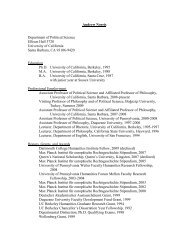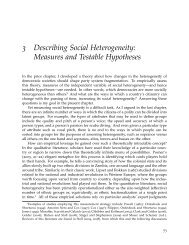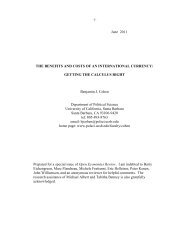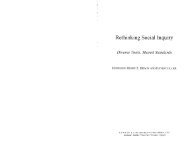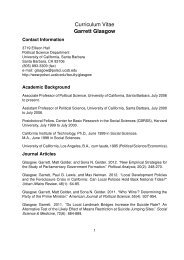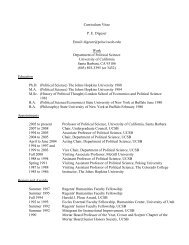-1- May 2012 THE YUAN'S LONG MARCH* Benjamin J. Cohen Can ...
-1- May 2012 THE YUAN'S LONG MARCH* Benjamin J. Cohen Can ...
-1- May 2012 THE YUAN'S LONG MARCH* Benjamin J. Cohen Can ...
Create successful ePaper yourself
Turn your PDF publications into a flip-book with our unique Google optimized e-Paper software.
-8-<br />
the degree of dependence that is engendered as foreigners come to rely on the national money for<br />
any of several international roles. The dependence of others puts the issuer in a position to<br />
exercise influence through its control of access to vital financial resources.<br />
5. Reputation. Finally, at the symbolic level, widespread international use of a currency<br />
can promote the issuer’s overall reputation in world affairs – enhancing authority, a form of “soft”<br />
power. Broad circulation may become a source of status and prestige, a visible sign of elevated<br />
rank in the community of nations. Influence may then be exercised through co-option and<br />
attraction to shape the preferences of others. Though difficult to pin down empirically, the<br />
importance of soft power in monetary affairs has by now been well established by historical and<br />
contemporary research (<strong>Cohen</strong> 1998, Helleiner 2003).<br />
Not all of these five classes of gains, however, can be associated with every role of an<br />
international currency. To the contrary, it seems more reasonable to assume that the net effects of<br />
the separate roles might actually differ quite substantially, as I have suggested elsewhere (<strong>Cohen</strong><br />
2010, <strong>2012</strong>a). Perhaps the most critical difference is between the several medium-of-exchange<br />
and unit-of-account roles, on the one hand, and the two store-of-value roles on the other. Use of a<br />
currency in foreign-exchange trading, trade invoicing, or for official intervention purposes will<br />
almost certainly generate some measure of gain at the microeconomic level. But only the storeof-value<br />
roles, which by definition imply some level of foreign accumulations, will generate any<br />
amount of seigniorage or macroeconomic flexibility for the issuing country – gains that could be<br />
quite substantial in magnitude. Neither seigniorage nor greater policy flexibility is possible<br />
unless non-residents are willing and able to acquire significant amounts of the country’s currency,<br />
or assets denominated in the currency, as a store of value. This suggests that the benefits of<br />
internationalization are unlikely to loom large if external use is limited alone to trade invoicing or<br />
the exchange market, which require minimal working balances at most. A considerable role in<br />
financial markets and/or reserves will be needed to make internationalization really pay<br />
economically or politically.<br />
Priorities and focus<br />
Seen in this light, Beijing’s strategic design would appear to be reasonably well<br />
conceived. Attention seems to be focused properly on the combination of roles that is most likely<br />
to satisfy the government’s ambitions. The Hong Kong and Shanghai Banking Corporation<br />
(HSBC 2011: 15) summarizes succinctly: “First trade, then investment; and after that, reserve<br />
currency status. That is the road map for the renminbi in a single sentence.”<br />
Of course, no one outside the ranks of China’s secretive leadership can be sure what the<br />
government’s priorities really are. Here too there may be divisions behind the scenes. Inferring<br />
from years of policy behavior, however, it seems fair to assume that aspirations must include<br />
political as well as strictly economic considerations. China may have an interest in saving on<br />
transactions costs or garnering a bit of seigniorage. Likewise, it is not unreasonable for the<br />
world’s biggest exporter to seek to use its own money more to reduce the currency mismatch in<br />
its international balance sheet. But from all we know about Beijing’s ambitions for a “peaceful<br />
rise” to great-power status, we have to assume that some measure of power is being sought as<br />
well. At a minimum this would involve a greater degree of autonomy, to reduce a sense of



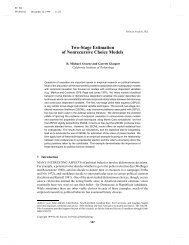
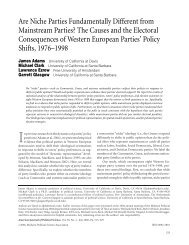
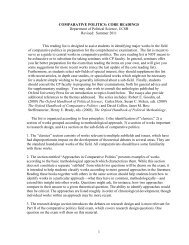
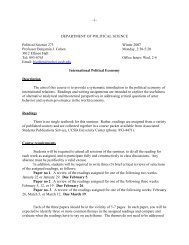
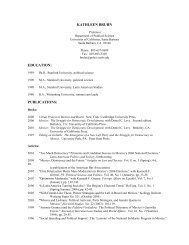
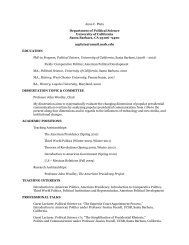
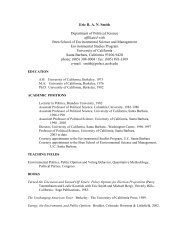
![Curriculum Vitae [abbreviated] John T. Woolley Professor of Political ...](https://img.yumpu.com/25423597/1/190x245/curriculum-vitae-abbreviated-john-t-woolley-professor-of-political-.jpg?quality=85)
